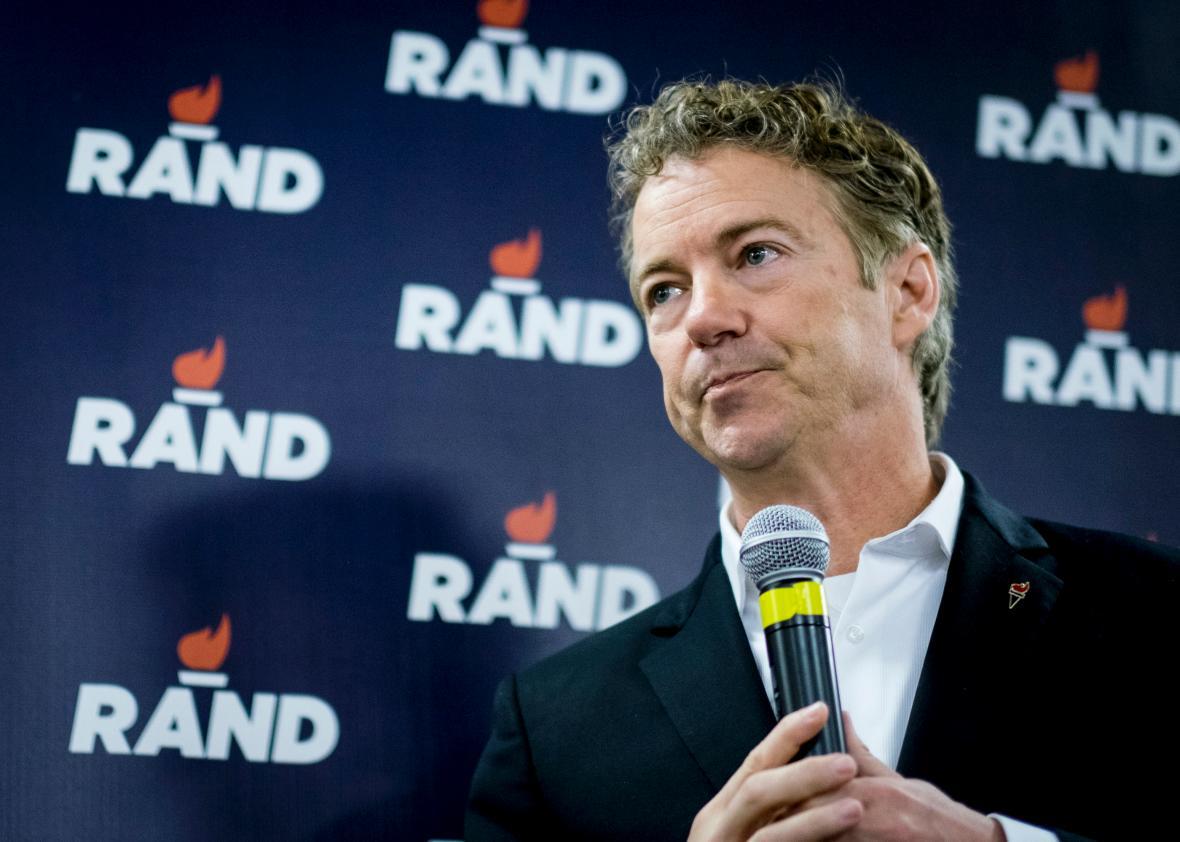Sen. Rand Paul, once the “most interesting man in American politics,” has dropped out of the Republican presidential race.
You can read this as a failure of Paul the candidate, who couldn’t inspire the enthusiasm of his father, Ron Paul, and couldn’t reach beyond his base of young people and students. And that’s true. But just as important to Rand Paul’s failure was the unprecedented gravitational force of Donald Trump, the largest mass in this constellation of candidates.
Paul had a simple and—when he entered the fray—persuasive theory for the GOP race. Since 2008, the Republican Party had grown more conservative, more skeptical of “big government,” and amenable to libertarian ideas as channeled through the Tea Party. At the same time, the GOP needed to branch out—it needed new voters. And if, as evidenced by the 2010 and 2012 elections, immigration reform was off the table, then Republicans had to find a way to grow the party without compromising key ideals.
Paul had an answer: You meet key demographic groups where they were with policies that directly touch their lives. And in particular, Paul argued, Republicans had to repair their long and complicated relationship with black Americans. “Several generations of black voters have never voted Republican and are not very open to even considering the option,” he confessed in a 2013 speech to students at Howard University. Paul’s pitch, emphasized in that speech, was criminal justice reform. “We should stand and loudly proclaim enough is enough. We should not have laws that ruin the lives of young men and women who have committed no violence,” he said. “That’s why I have introduced a bill to repeal federal mandatory minimum sentences. We should not have drug laws or a court system that disproportionately punishes the black community.”
As a vehicle for this message, the Kentucky senator wasn’t perfect. His address at Howard, for instance, was a little tone deaf, explaining the history of black voters and the GOP as if politics students at the nation’s premier university for black Americans (in Washington, no less!) were ignorant of the relationship. Likewise, Paul wouldn’t compromise partisan priorities like voter identification, even if opposition would build bridges with black Americans. And Paul had his own difficult history in the form of his father’s background with racists and neo-Confederates, and his opposition (later qualified and obsfucated) to the Civil Rights Act of 1964 on principled—if, to many observers, unconvincing—libertarian grounds.
Still, unique among the GOP’s presidential aspirants, Paul tried. As late as Monday, before the Iowa caucus, Paul was touting his plans to wind down the drug war to a group of students at Iowa State University. Under better circumstances, it might have borne fruit. But Trump changed the game. Whereas Paul wanted to appeal to minority voters, Trump aimed to antagonize them, sharing racist and anti-black memes on Twitter and warning voters of a dangerous, brown-skinned menace. With his campaign against Latino immigrants and Muslims writ large, Trump amassed a huge following—large enough to give him an impressive second-place finish in the Iowa primary. But Trump’s most important impact is to introduce a new kind of Republican heterodoxy to American politics. Where Paul pushed a conservative-libertarian fusion as the solution to the GOP’s electoral problems, Trump has shown that the real alternative is a kind of white nationalism, unmoored from conservative governing principles and dedicated to protecting the United States from nonwhite others, internal and otherwise.
Republican voters have flocked to this, and in response, mainstream Republican candidates have aped the approach. For months, Texas Sen. Ted Cruz praised Trump in between his furious denunciations of the “Washington cartel.” Florida Sen. Marco Rubio, facing pressure from Trump in New Hampshire, has abandoned his once sunny disposition, railing against ISIS and other foreign threats with apocalyptic fervor and echoing Trump’s claim that “our military is a disaster” and “our country is run by incompetent people.” “It’s now abundantly clear,” declared Rubio at a New Hampshire campaign stop in January, “Barack Obama has deliberately weakened America. He has made an intentional effort to humble us back to size, as if to say: We no longer need to be so powerful because our power has done more harm than good.”
Cruz and Rubio aren’t minor figures. They are the leading candidates for the Republican presidential nomination. Which is to say that, through force of rhetoric and personality, Trump has pulled the GOP toward his person and shaped it in his image. He has done, in other words, what Paul couldn’t do, because GOP voters didn’t want to do it. Or at least, not on Paul’s terms.
Paul’s terrible miscalculation was to believe that Republican voters—or at least a critical mass of them—cared about ideology. That they wanted someone who was consistent and could bridge the gaps between libertarians and conservatives, while winning new and old groups to the Republican fold. But they don’t. After almost eight years of Obama, what Republican voters want is strength and aggression. And in Trump and his imitators, that’s what they have.
